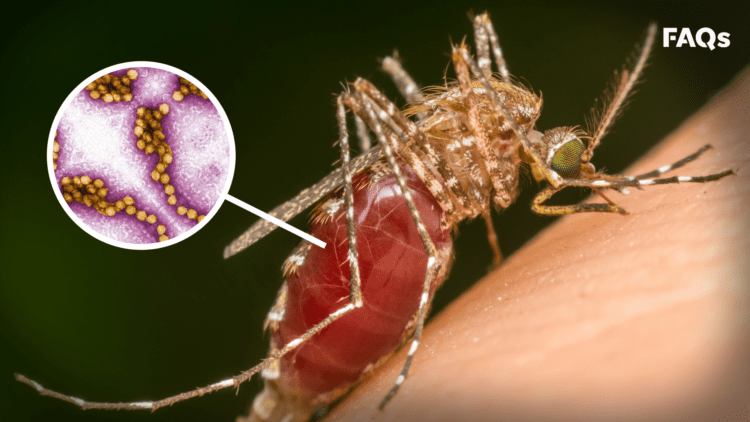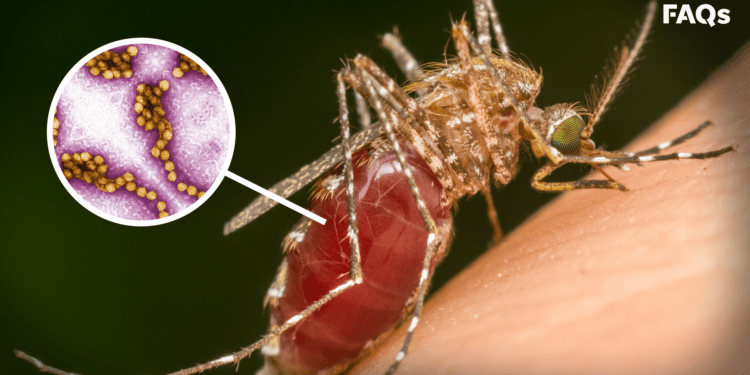
Leading symptoms of West Nile Virus, explained
West Nile Virus is the leading cause of mosquito-borne diseases in the U.S., with the highest concentration in the Midwest. Here’s how to tell if you’re infected.
Two more people in Massachusetts have been diagnosed with West Nile virus, officials announced Tuesday.
With the new cases, there have been four human diagnoses in the state this year.
The Department of Public Health said both new cases are in males in their 60s. One was exposed to the virus in Suffolk County, and one was exposed in Norfolk County.
Officials said it is currently peak time for West Nile activity in Massachusetts, so it is important people throughout the state stay vigilant.
Here’s what to know about the new cases and which areas are at high risk.
Two more cases of West Nile virus in MA; state total rises to four cases
Two more people in Massachusetts have been infected with West Nile virus this year, state officials announced Tuesday.
So far, there has been four human cases of the virus in the state this year. The first one was announced earlier this month in a male in Hampden County.
There are usually a few cases every year in the state; last year, there were six cases of West Nile virus in Massachusetts.
Public Health Commissioner Robbie Goldstein said in a release that risk levels for the virus won’t go away until the first hard frost.
“We are currently in the peak time for West Nile virus activity in Massachusetts, which will continue into September. As the amount of disease in mosquitoes increases, so do the chances for human infection,” Goldstein said.
West Nile virus high risk areas in MA
Following Tuesday’s announcement of two more West Nile cases in Massachusetts, officials increased the risk level for the virus in several areas across the state. See the full list:
High risk areas for West Nile virus
Middlesex County
CambridgeEverettMedfordNewtonSomervilleWatertown
Norfolk County
Suffolk County
Plymouth County
AbingtonBrocktonEast BridgewaterMarionMattapoisettRochesterWhitmanHow to stay safe from West Nile virus
The best way to stay safe from West Nile virus is to protect against mosquito bites, officials say.
The DPH recommends using mosquito repellent with an EPA-registered active ingredient while outdoors, wearing clothing that reduces exposed skin and avoiding evening outdoor activities.
Mosquitoes are most active from dusk to dawn.
MORE: What’s the difference between West Nile virus and EEE?
What is West Nile virus?
West Nile Virus is a mosquito-borne illness spread to humans who have been bitten by an infected mosquito. According to the CDC, it is the leading cause of mosquito-borne illness in the United States.
Symptoms of the virus include fever, headache, body aches, vomiting, diarrhea or rash. About 1 out of every 150 infected people can develop a serious illness, according to the CDC.
The virus is not contagious between people because humans are dead-end hosts, which means they don’t pass on the virus. There is a median of about 2,200 West Nile virus cases in the U.S. every year, according to the Department of Health and Human Services.
Source link : http://www.bing.com/news/apiclick.aspx?ref=FexRss&aid=&tid=66cfe7e462e24c1a9e9665d850d79291&url=https%3A%2F%2Fwww.patriotledger.com%2Fstory%2Fnews%2Fenvironment%2F2024%2F08%2F28%2Fwest-nile-virus-mosquitoes-massachusetts-illness-cases-high-risk-mosquito-borne-illness%2F74978230007%2F&c=8488551534042347136&mkt=en-us
Author :
Publish date : 2024-08-28 02:43:00
Copyright for syndicated content belongs to the linked Source.



